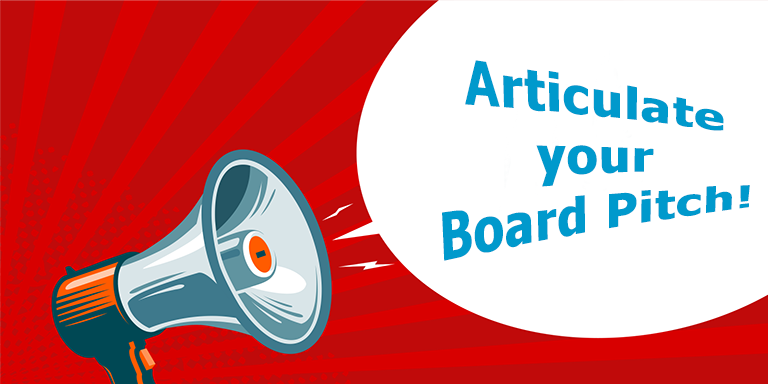How to write a powerful Board Profile

Before you begin your board search or even write your board CV, it is essential that you write a board profile that is powerful and will get you selected for a board interview. It is one of the most significant challenges I see potential board members struggle with. Once written, you must confidently be able to articulate what you bring to the table.
There should be no such thing as a static board profile. Your board profile should be customized slightly, depending on the reader and organization you are pitching to. Your board profile must address the five (5) core elements that chairs of decision-makers want to see in successful board candidates. They are prior governance experience, executive skills, networks and connections, demonstrable passion and cultural fit. There are several other elements to consider: industry experience, governance qualifications and diversity. Being able to articulate these both formally and informally, is your board pitch or USP (unique selling position). Essentially, the reason you should be appointed to a board.
Key sentences to include in your Board Profile
The 1st Sentence
I strongly recommend starting your written profile by telling people that you have done the role you are seeking. This is easy to do if you have already had a board seat. If you haven’t, you must get creative, perhaps leveraging any committee, governance, or board-level experience.
Having started strongly, you should then continue your introductory sentence with the amount of experience you have in this space. Following this, but within the same sentence, you should also list your past executive titles such as CEO, Director, Accountant, Lawyer, HR Director or the like. Only use your title, not a description of what you did. This element will provide comfort that you have the skills required at board level.
You must be clear about your board-level experience (executive or non-executive) so that others can grasp it quickly and ‘peg’ you accordingly. For this reason, demonstrating some form of governance experience (board or committee) is really valuable when writing your board profile. Ideally, you want to begin this sentence with “I am a Non-Executive (or equivalent board-level title that you have ie. independent director).”
The 2nd/3rd Sentences
Following a solid opening statement, you need to support it with some detail about your board experience and the value it holds at the board level. Here you must convince people that you are not an aspiring independent director but a successful board-level professional.
To address this aspect of your board profile, you need to clearly understand how your primary skills and experience will contribute at board level. Being unclear about this is a killer. When writing this section of your profile, ensure that you make no assumptions that the reader understands what you have and can achieve. Be clear about what you have to offer the board and articulate it succinctly – don’t forget to qualify it with your successes.
Then, insert (after completing them) these two statements
At board level what I do is…
I do that by…
Together, your first three sentences are key. So start strong by stating what you have achieved on and with boards. It shows that you know your value at board level and is a powerful way to begin any board profile.
The 4th Sentence
You need to provide further detail of your experience at board level. The best way to do this is by providing some examples of success. By way of guidance, you might say, “At board level, highlights include (add the board or board level roles you have held)”. Then, state what your contribution was to each.
Keep in mind that this is an exercise in succinct writing, so you cannot include everything. Just include your greatest successes and the things you are most proud of. A few highlights should suffice.
To do this, I recommend that you reflect on your successes in 3 ways:
What were the reasons why you were appointed, and have you fulfilled them?
What reasons would you give the Chair when asking for a ‘pay rise’?
Link your success to the organization’s success whilst you were a director.
The 5th Sentence
This section should be easier to write than the previous ones, as most of it should already be in your executive CV. It summarizes your executive experience. Focus on the highest-profile roles you have held, with the highest-profile organizations you have worked for first. Not everything you have ever done should be included here, as other relevant roles will be included in the body of your board CV. So, for example, if you are currently a consultant but were previously a CEO or director, then lead with information about your highest profile or most relevant positions first.
You can include some quantifiable statements of success as an executive if necessary. You might start with a sentence like this: “As CEO of ACB Corp I …”
The Final Sentence
Boards seek intelligent and educated people, so you should demonstrate this. If you have an MBA, include it here. If you have a degree, include it here. Likewise, if you have completed some other form of governance training, include it here. This content will form your board profile’s final part and summarise your educational qualifications and any particular extra-professional successes.
The importance of a governance qualification shouldn’t be underestimated, so if you have one, this is the place to show it off – in addition to your other qualifications and memberships.
You should also list the names of relevant industries or governance bodies you are a member of, as they can demonstrate intent and commitment to governance. If you don’t have particularly good educational qualifications, I do not recommend including them.
In Summary
Your board profile is the pivotal language you will use during almost every step of the board appointment process – formal and informal. It will also form the crux of your ‘elevator pitch’ that you will use when introducing yourself to prospective connections. Further, it is the source from which you will write any board application and will be at the centre of your board cover letter and board CV. Your board search will likely stagnate without a well-crafted and easily articulated board profile.
Getting your board profile right can take some time, and it will differ depending on the recipient, so be willing and able to adapt it quickly. Remember that it should answer the question, “why should you be appointed to this board?” By answering this question, you will dare them not to appoint you.
Related Articles
What are the selection criteria for independent board members?
About the Author
David Schwarz is CEO & Founder of Board Appointments. He has over a decade of experience in putting people on boards as an international headhunter and recruiter. He has interviewed hundreds of directors and placed hundreds into some of the most significant public, private and NFP director roles in the world.







Responses